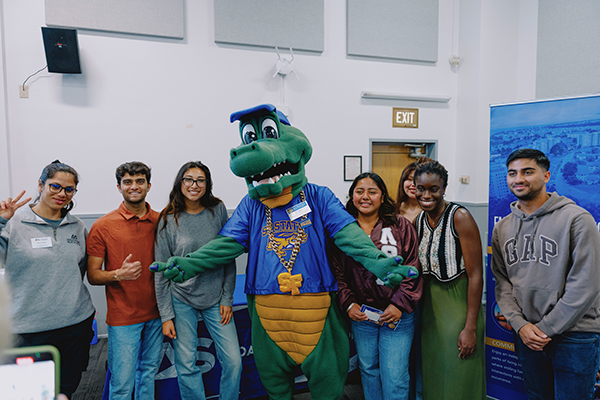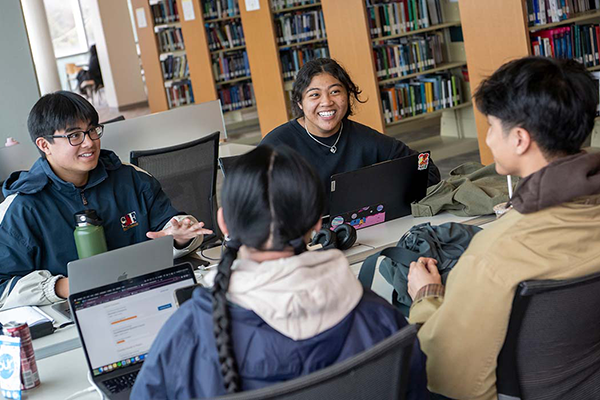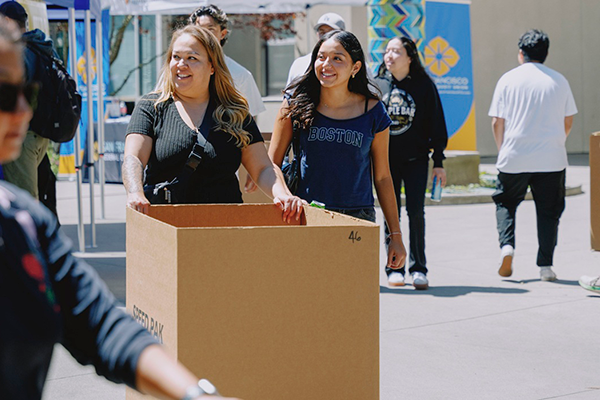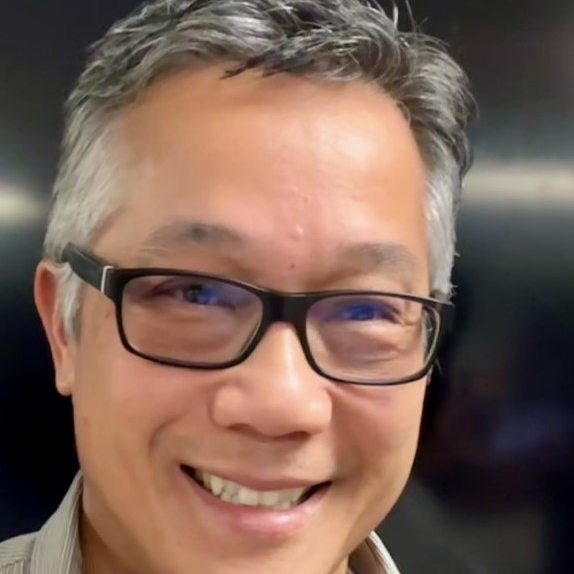News and Announcements

With a new school year about to begin, the outlook at SFSU is bright. Our faculty and staff joined in community on Aug. 21 for the Opening Convocation, a traditional academic ceremony celebrating each new academic year. The event took place in McKenna Theatre and was streamed live.
In his speech, Associated Students President Brandon Foley talked about his appreciation for the dedication of our Gator faculty and staff, encouraging a continued focus on the wellbeing of our students.
“While we continue our advocacy and fight for justice and a better San Francisco State in Sacramento and Washington, D.C., never underestimate the good you can do in a single day right here on campus,” said Foley, a graduate student in Electrical and Computer Engineering. “The extension you give to a student because they’re going through a rough patch in life might be the reason they stay enrolled next semester. That office birthday celebration — which by the way, if you’re thinking of doing it, definitely do it — could be the highlight of someone’s day. The resources you decide to share, even though if it’s not specifically a part of your job, could be someone’s lifeline, for real. These choices you make aren’t just kindness — They’re changing lives one step at a time.”
In SFSU President Lynn Mahoney’s annual address on the state of the University, she discussed opportunities to prepare students for careers that will require skills in artificial intelligence and strategies to boost enrollment.
“We will lean into what makes SFSU distinctive, in ways that the purpose-driven young people of today and tomorrow can relate to,” Mahoney said. “A university that embraces its responsibility for post-collegiate outcomes. A university that transforms lives and promises upward mobility. A university where equity, innovation and community meet.”
Other speakers included California Faculty Association chapter President Brad Erickson, CSU Employees Union chapter President Christine Hintermann, Staff Council President Dylan Mooney and Academic Senate Chair Jackson Wilson. Administrators welcomed the four new tenure-track faculty members joining the Gators this year.
Convocation also featured an awards ceremony honoring our distinguished faculty and staff:
- Excellence in Service (Staff): Myla Adeva, senior credential analyst in the Graduate College of Education
- Excellence in Teaching (Lecturer): Daniel Ciomek, lecturer faculty in Information Systems
- Excellence in Teaching (Tenured): Rama Ali Kased, associate professor of Race and Resistance Studies
- Excellence in Professional Achievement (Tenured): Anthony Pahnke, associate professor of International Relations
- Excellence in Service (Tenured): Jackson Wilson, professor of Recreation, Parks and Tourism; president of the SFSU Academic Senate
Foley, the Associated Students president, ended his speech with a rallying call to get things going: “Now let’s make it matter. Thank you so much, and go Gators!”
Visit the Academic Senate website to learn more about the Opening Convocation.
Photo by Juan Montes

SFSU, the premier public university that educates and equips students to thrive in a global society, has added 83 new Associate Degree for Transfer (ADT) pathways. This significantly expands opportunities for guaranteed admission to SFSU for California Community College (CCC) transfer students.
The new ADT pathways, which provide transfer students a detailed plan to earn their bachelor’s degree in four years, span six key academic departments: Apparel Design and Merchandising, Race and Resistance Studies, Child and Adolescent Development, Communication Studies, International Relations and Journalism. With the expansion of 83 new pathways, SFSU now offers a total of 264 pathways. This makes SFSU among the CSU campuses that offer the most pathways.
“With this expansion, we are making it even easier for transfer students to come to SFSU,” said Vice Provost of Academic Planning and Dean of Undergraduate Education Lori Beth Way. “These pathways provide a clear, step-by-step roadmap so that students know exactly what to do from the time they step foot at a community college up until they transfer and graduate from SFSU.”
How ADT pathways work
The Associate in Art for Transfer (AA-T) and the Associate in Science for Transfer (AS-T) are types of associate degrees that students may earn at a California community college that guarantee admission to a CSU campus, including SFSU. ADT pathways are the advising pathways students follow at their respective community college to earn an AA-T or AS-T.
For example, one pathway is earning an AA-T in English and then transferring to SFSU to complete a B.A. in English. Another pathway is pursuing that same AA-T but completing a B.A. in Creative Writing. By providing many different pathways into multiple majors, SFSU can meet each student’s unique needs, education goals and career aspirations.
“The beauty of what we’re trying to build is that students should have choice and freedom,” said University Articulation Administrative Analyst Christopher Sugarman, who coordinates with academic department chairs to develop new pathways. “The more pathways that our departments are able to accept means more opportunities for a student to come to SFSU and chart their own unique future.”
For each ADT pathway, students will spend two years at a community college to earn their AA-T or AS-T by completing 60 units, typically courses in general education in addition to some courses devoted to lower-division major curriculum. Once they earn their ADT, they can transfer to SFSU and enroll in a bachelor’s program similar to their associate degree. At SFSU, students will spend another two years to earn their bachelor’s degree by completing 60 more units, typically with a specific set of courses geared toward their major of choice. Learn more about the different routes students can take after completing their ADT of choice.
“The Associate Degree for Transfer is a proven pathway that empowers students to reach their educational goals. It removes barriers, guarantees CSU admission and offers a clear, affordable route to a baccalaureate degree, which remains one of the most powerful drivers of economic mobility and lifelong opportunity,” California Community Colleges Vice Chancellor of Academic Affairs James Todd said. “Ensuring that all students have a fair chance to earn a bachelor’s degree is central to the California Community Colleges’ mission and guides the work in our strategic plan, Vision 2030.”
This expansion also aligns with California’s efforts to streamline the transfer process and improve four-year graduation rates. In 2010, California passed the STAR Act, which allows community colleges and CSU faculty to create ADTs and form pathways.

SFSU was abuzz with excitement Aug. 19 and 20 as thousands of Gators hauled suitcases, laptops, plants and snack stashes into their new homes on campus. The move-in days officially marked the start of the 2025 – 26 school year — bringing with them a time of fresh starts, fun and community-building.
“I’m excited to make connections, meet people, get an education,” said Business major Aidan O’Connell.
An Oakland native, O’Connell added another reason he’s excited to move onto the SFSU campus: “I’ve always wanted to live in S.F. I can BART home. It’s really easy.”
Marketing and International Business major Lais Madi Priedols comes from a lot further away — Brazil — but she shares O’Connell’s enthusiasm for SFSU’s San Francisco location and inclusive, dynamic vibe.
“I chose to come to SF State because of the diversity. I really like the environment here. SF State provides a very welcoming place, as does San Francisco,” she said. “[There are] a lot of different people, and I really enjoy that.”
Students like O’Connell and Priedols aren’t alone. Hundreds of Gators move onto campus each fall eager to build connections and make the most of life at SFSU. The University’s seven residential communities are designed to help them find their people and succeed. With one resident assistant for every 35 to 55 students — plus Residential Life staff on call 24/7 — resources and guidance are always close by. Living on campus also puts students just steps away from classes, dining, events and everything SFSU has to offer.
And it pays off. Surveys show that 81% of students living on campus found others who share their interests, while 77% said they felt a strong sense of belonging. Living on campus also boosts academics: more than half of residents landed on the Dean’s List last year.
“Living on campus is about so much more than convenience,” said Associate Vice President of Housing, Dining & Conference Services Jeny Patino. “It’s where students build friendships, discover opportunities and create the foundation for success.”
Photo by Juan Montes
Eight SFSU students are among the 85 Sally Casanova California Pre-Doctoral Scholars for 2025 – 2026.
SFSU winners:
- Jo Nisa Cabilogan, graduate student in Psychology. Faculty mentor: Zena Mello.
- Lo Klauer, graduate student in Sexuality Studies. Faculty mentor: Ikaika Gleisberg.
- Francesca Mejia, graduate student in Race and Resistance Studies. Faculty mentor: Jason Ferreira.
- Sam Hyder, graduate student in English. Faculty mentor: Virginia Schwarz.
- Elijah Valverde, undergraduate in Mathematics. Faculty mentor: Emily Clader.
- Daphne Jomo, undergraduate in Computer Engineering. Faculty mentor: Alyssa Kubota.
- Sebastian Bustamante Ceja, graduate student in Cinema. Faculty mentor: Mihaela Mihailova.
- Merrissa Hart, graduate student in Education. Faculty mentor: Helen Hyun.
Each scholar will receive $5,000 from the annual lottery allocation. The scholarship supports a plan developed with each student’s faculty mentor. The scholars will also have the opportunity this fall to apply for a 2026 summer research experience at a doctorate-granting institution.
The California Pre-Doctoral Program has supported the doctoral aspirations of CSU students for 36 years. This year, the advisory committee, which consisted of faculty and administrators from the CSU and the University of California, reviewed 277 student applications for the California Pre-Doctoral Program.
A preliminary follow-up study of former Sally Casanova Pre-Doctoral Scholars indicates that more than 40% enter a doctoral program by the term following their scholarship year. A major reason for this program’s success has been the demonstrated support and commitment of the faculty mentors and California Pre-Doctoral Program coordinators involved.

Carleen Mandolfo, associate provost for Faculty Affairs, is pleased and grateful to announce that Sheldon Gen has accepted the position of associate dean of Faculty Affairs and Professional Development. Gen served as interim associate Dean during the 2024 – 2025 academic year.
He successfully led projects and programs that support faculty recruitment, retention, tenure, promotion and professional development. Specifically, he spearheaded a new initiative to support associate professors in their development toward full professor. Partnering with the Office of Research and Sponsored Programs and the Center for Equity and Excellence in Teaching and Learning, he also planned and implemented a successful one-day faculty writing retreat open to all professors.
Gen is a professor in the Public Administration Program at SFSU. He is the co-author of “Nonprofits in Policy Advocacy: Their Strategies and Stories” (2020), a book investigating how nonprofit organizations influence public policies. Prior to his academic career, he was a civil engineer with public agencies including the Peace Corps, U.S. Air Force and Environmental Protection Agency. In 2020 he was re-elected to the Board of Education of Petaluma City Schools. A son of immigrants and a first-generation college graduate, he holds a B.S. degree in Civil Engineering from Cal Poly San Luis Obispo, an MPA from the University of Southern California, and a Ph.D. in Public Policy from Georgia Tech. He is also an alumnus of the Presidential Management Fellowship and the Wikipedia Teaching Fellowship and the recipient of the Peace Corps’ Franklin H. Williams Award for outstanding public service.
Gen primarily teaches in the Master of Public Administration and the Doctor of Educational Leadership programs at SFSU. His courses cover public policy processes, civic engagement in public policy, policy analysis, program evaluation, environmental policy and education policy. In the MPA program, he advises students on public policy and environmental administration emphasis.
The West Grove Commons residence hall at SFSU has won the Engineering News-Record West Best Regional Project – Award of Merit in Higher Education/Research and set a CSU system record by completing the six story, 120,000-square-foot residence hall in 16 months.
Using a collaborative progressive design-build approach, SFSU worked with design firm EHDD and McCarthy Construction to open the residence hall in time for the fall 2024 semester. The all-electric 50,000-square-foot dining hall and student health and wellness center opened in March 2025. This strategic phasing helped address SFSU’s student housing needs while maintaining quality and efficiency. Eligible students also benefit from a 25% reduction in room fees.
Academic Technology (AT) has resumed extended hours to support evening classes. The new hours are Mondays – Thursdays, 8 a.m. – 8 p.m. Friday hours will remain 8 a.m. – 5 p.m. Please visit us in Library 80 or contact us by phone at (415) 405-5555 or by email at at@sfsu.edu.
AT has compiled technology guides to help faculty and students review resources and recommendations for a wide range of critical technology needs.
Get help with AT services on ATHelp: Select a topic to view how-to guides or participate in the community forum to ask questions and share ideas.
And did you know AT makes video content? Find out more on the AT YouTube channel.
As part of SFSU’s commitment to maintaining the highest standards of data security, all employees are requested to review the University’s Payment Card Industry (PCI) policy. This policy ensures that all campus entities that require payments are consistent, efficient and secure as they protect the interests of the University, its auxiliaries and individuals, including students and employees, and organizations conducting business with SFSU.
This policy outlines the requirements and provides guidance to ensure that all payment card acceptance and e-commerce processes comply with PCI data security standards.
For questions or to be added to the list of approved locations, please email the PCI Committee at pci@sfsu.edu.
The AI Literacy Education Program equips the SFSU community with essential knowledge and skills to effectively and responsibly engage with generative artificial intelligence (AI). Please join us this fall to engage in guided inquiry of this emerging technology, catch up on your digital badging progress or level up your understanding of generative AI.
Are you a faculty member looking for an extra credit assignment to offer students in your fall 2025 classes? If so, please encourage students to become a Peer2Peer mentor.
SFSU supports incoming students by offering mentorship from trained continuing students through the Peer2Peer mentorship program. Research shows that both receiving and providing mentorship significantly contribute to student success. In today’s mentorship-focused job market, being a Peer2Peer mentor can help students stand out.
To help recruit mentors, faculty are encouraged to consider offering extra credit to students who serve as Peer2Peer mentors. Sample language that you may use for an extra-credit assignment can be viewed via Box.
For questions, please email Susanna Jones, First-Year Experience faculty director, at susjones@sfsu.edu.
Please help spread the word: Monday, Sept. 15, is the application deadline for students who wish to study abroad in spring 2026 through SF State Abroad programs.
Why recommend study abroad to your students?
- Pay the same SFSU tuition while abroad.
- Use their financial aid.
- Earn resident SFSU credit.
- Benefit from a lower cost of living in many host countries.
- Opportunities are available in 36 countries worldwide.
- Fulfill major major or minor requirements, general education (upper and lower division) and language learning goals.
Please encourage your students to attend the International Education Exchange Council Study Abroad Fair on Wednesday, Sept. 10, 11 a.m. – 2 p.m., on the Quad next to Malcolm X Plaza. They can connect with international students and study abroad alumni.
Please visit the SF State Abroad website for more information.
The SFSU Fine Arts Gallery presents “Beads and Belonging,” an exhibition exploring the ways beadwork and beads are common means of expression across cultures. It is open Tuesdays – Fridays, noon – 4 p.m., through Thursday, Sept 4.
Guest curated by Kristina Singleton (M.A., Museum Studies, ’25), this exhibition features works by Demetri Broxton, Taraneh Hemami, Chelsea Kaiah, John Paul Morabito, Gabrielle Severson, Charlene Tan and Nico Williams. The exhibition also includes an ancient Egyptian beaded work on loan from SFSU’s Global Museum. “Beads and Belonging” is supported by a grant from the Zellerbach Family Foundation.
Patterns, connections and narratives come to life bead by bead. Through means of trade, adornment and cultural signifiers, beads are global visual and physical communicators. From beaded artifacts to contemporary beadwork, the broader complexities of colonial influence forge a narrative that is revealed and subsequently addressed by contemporary artists. Despite the legacies of colonialism tied to the histories of beads, the act of beading allows for connections to ancestors, those who came before, while also making meaning of the present.
The artists in this exhibition actively respond to the historical narratives while making meaning of current challenges. Beadwork becomes a form of reclamation of identity and an act of resistance through the preservation of personal and cultural narratives. Using beads of all kinds to tell these stories, the exhibition explores beadwork as a means of expression across cultures.
To visit by appointment, please email fineartsgallery@sfsu.edu.
The Digital Media Studio/MakerSpace will host an open-house event, open to all SFSU students, faculty and staff, on Thursday, Aug. 28, 2 – 6 p.m. Learn about 3D printing, virtual reality, podcasting, audio mixing, Internet of Things/micro-controllers/robotics, and video/audio equipment checkout. Check out presentations of student projects with edge computing, artificial intelligence, Apple Vision Pro and more.
The Office of Faculty Affairs and Professional Development invites tenure-track faculty to participate in its workshops this semester to help prepare for retention, tenure and promotion (RTP). Sheldon Gen, associate dean for Faculty Affairs and Professional Development, will lead the workshops with a member of the University Tenure and Promotion and Committee (UTPC).
Faculty who will be reviewed in the next few years are encouraged to attend. The workshops are organized according to different phases of faculty professional development, but topics covered in each of the workshops will be similar, so feel free to attend the workshop that best fits your schedule.
- Friday, Sept. 5: noon – 1:30 p.m.: Focus on retention years one and two
- Monday, Sept. 8: 1:30 – 3 p.m.: Focus on promotion to associate professor (hosted with UTPC)
- Tuesday, Sept. 9: noon – 1:30 p.m.: Focus on promotion to full professor (hosted with UTPC)
- Thursday, Sept. 11: 1:30 – 3 p.m.: Focus on retention years three through five
Please RSVP via Qualtrics to receive a link for the workshop of your choice. An invitation link will be sent to your SFSU e-mail address the day before the workshop.
Gen will also host office hours for RTP candidates to discuss specific issues. Office hours are Wednesdays 11 a.m. – 1 p.m., Wednesday, Sept. 3 – Wednesday, Oct. 15, in Administration 451B. Please drop in or email Gen at sgen@sfsu.edu to reserve a time.
The School of Liberal Studies faculty and staff are heartbroken to announce the passing of Professor of Medical Anthropology Mariana Kawall Leal Ferreira, a beloved teacher, scholar, human rights advocate and friend. She passed away on July 9, leaving behind a legacy of intellectual breadth and a profound commitment to justice.
Born in 1959 in São Paulo, Brazil, Ferreira began her journey as an engaged scholar and activist early, when at the age of 19, in 1978, at the height of the Brazilian military dictatorship, she taught mathematics at a Xavante Indigenous village in the Brazilian Cerrado. Teaching underprivileged communities at this time, primarily through the lens of Paulo Freire’s liberation pedagogy, was an act of defiance against an oppressive regime, requiring considerable courage (she concealed Freire’s banned books behind the covers of romance novels). This experience shaped her intellectual work at the intersection of Indigenous knowledge, ethnomathematics, medical anthropology and human rights.
Ferreira earned her Ph.D. in 1996 in the Medical Anthropology joint program at UC Berkeley and UC San Francisco, focusing on Indigenous health. She joined SFSU in 2003, initially teaching in the Department of Anthropology before coming to the School of Humanities and Liberal Studies in 2014, where she served as associate director. Her interdisciplinary courses, such as “Human Rights Education for Future Educators,” “Social Science and Medicine” and “Performance and Pedagogy of the Oppressed,” were transformative experiences for students, combining theoretical perspectives, activism, active engagement, critical pedagogy and community engagement. Phil Davis, an educator and author of “Guerrilla Visions: Wild Tales of Teaching Human Rights at an Alternative High School,” while reviewing her Theatre of the Oppressed-based pedagogy, called her teaching “transformative,” emphasizing how she brought critical theories to life.
Professor Ferreira was a powerful voice for equity and justice. She was the main organizer of SFSU’s annual Human Rights Summit for over a decade. Through this experience, she led students in developing and performing plays exploring topics such as colonialism, racism, migration, health disparities and Indigenous rights. Following Freire’s pedagogy, such topics were always selected by the participants and reflected their own personal interests. She also guided students in creating public murals across the Bay Area, using art as a tool for learning, healing and resisting oppression.
In 2017, Professor Ferreira was awarded the Edward O’Brien Award for Human Rights Education by Human Rights Educators USA, a recognition of her decades-long work in integrating human rights into higher education. As an O’Brien Award nominator praised her work — “If you don’t know your rights, you don’t have any!” — was one of Professor Ferreira’s mantras.
Professor Ferreira was a prolific scholar who wrote more than 100 articles and plays. Her scholarship blended serious academic rigor with community collaboration. Her research focused on participatory methods, especially among Indigenous peoples. She was committed to valuing non-traditional ways of knowing, especially Indigenous ones.
In addition to her scholarly work, she developed health curricula with Bay Area clinics, including the Mission Neighborhood Health Center, reaching underserved patients through culturally sensitive education.
Professor Ferreira’s teaching and scholarship were truly interdisciplinary. Her research was guided by a deep respect for the communities she studied and collaborated with, resulting in transformative work through the power of education, art and collaboration. She inspired generations of students to become educators, activists, researchers and storytellers who were guided by their commitment to approach their work with justice and humanity.
She will be remembered not only for her groundbreaking research and brilliance but also for her warmth and unwavering commitment to marginalized peoples. Her voice will continue to echo through her students, her scholarship and the communities she helped.
She is survived by her husband Nathan, son Mairum, daughter Djuni, son Pedro, daughter Amanda and five grandchildren, Naia, Lua, Yali, Andre and Thomas.
SFSU Spotlight
NASPA, a U.S.-based organization for student affairs administrators in higher education, will honor President Lynn Mahoney and Vice President for Student Affairs Jamillah Moore later this fall. NASPA, founded in 1919, has over 13,000 members at 1,400 campuses in 25 countries.
Mahoney will receive the Region VI President’s Award. This special recognition is given to a college or university president or chancellor who has, over a sustained period of time, advanced the quality of student life on their campus by supporting student affairs staff and initiatives.
Moore will receive the Region VI Distinguished Service to the Profession Award. The award is presented to a NASPA member who has, over an extended period of time, demonstrated outstanding contributions to higher education and the student affairs profession.
An advertorial article on SFGate on Aug. 12 featured the ElderCollege, a program that allows older adults to audit classes at SFSU.
“This is one way we provide access to ensure that folks of all generations have access to coursework,” said Angie Lipschuetz, associate dean of the College of Professional & Global Education.
ElderCollege fits among other programs at SFSU like Open University, which lets community members take courses for academic credit without formal admission, and the Osher Lifelong Learning Institute, which offers courses specifically for people 50 and older.